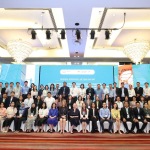Total number of posts 463.
Jakarta and Washington are working to finalize the Reciprocal Trade Agreement by the end of October 2025, following a handshake deal reached in July. However, the negotiation process has been disrupted as the U.S. government temporarily shut down due to a budget impasse in Congress.
Coordinating Minister for Economic Affairs Airlangga Hartarto, who heads the Indonesian delegation, said that the bilateral negotiations had concluded and were now in the “legal drafting” stage, which is expected to be completed within October. Indonesia has scheduled at least six virtual meetings with the Office of the United States Trade Representative (USTR) over the coming weeks and plans to visit Washington, D.C. at the end of the month to sign the agreement, becoming one of the first countries to conclude such a reciprocal trade deal with the United States.
From left to right: U.S. Trade Representative Jamieson Greer, U.S. Secretary of Commerce Howard Lutnick, and Indonesia’s Coordinating Minister for Economic Affairs Airlangga Hartarto. Photo: Facebook/@Airlangga Hartarto
Indonesia was the first country to reach a framework tariff arrangement with the United States, which reduced tariffs on Indonesian exports from 32 percent to 19 percent in July, in exchange for certain trade concessions.
The upcoming meetings between the two sides will mainly focus on finalizing the list of commodities exempted from reciprocal tariffs, with palm oil, natural rubber, and cocoa expected to enjoy zero import duties. The United States has agreed to exempt most agricultural commodities that it does not produce domestically, and Indonesia is seeking to expand this list. In addition, both sides will discuss removing non-tariff barriers, consistent with Indonesia’s commitment to import liberalization.
However, the U.S. government shutdown that began on October 8, following the failure to pass the federal budget bill, has temporarily halted the online meetings between the two parties. Experts warn that this could delay the signing and ratification process of the agreement.
After the signing, the implementation of reciprocal tariffs will require domestic ratification. Experts noted that if the agreement can be enacted through a presidential decision, the process may take three to six months; however, if parliamentary approval is required, the ratification could take up to twelve months.
Source: Compiled by the Multilateral Trade Policy Department, Ministry of Industry and Trade of Viet Nam














